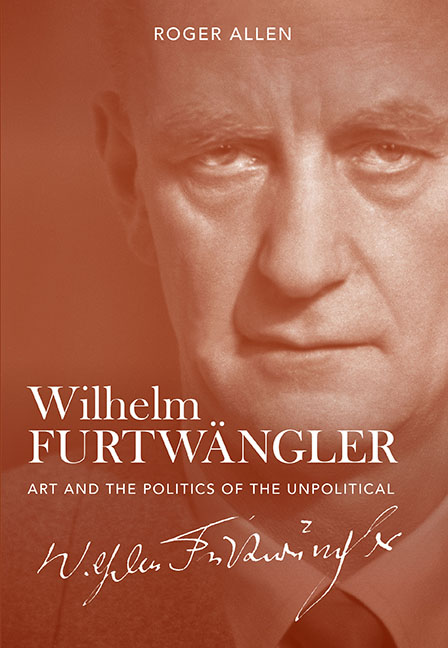Book contents
- Frontmatter
- Dedication
- Contents
- List of Illustrations
- List of Abbreviations
- Prelude
- Acknowledgements
- Preface
- Note on Translations
- Chronology
- Introduction
- 1 Wilhelm Furtwängler: The Historical, Cultural and Intellectual Background
- 2 Childhood and Youth (1886–1911)
- 3 Lübeck and Mannheim (1911–20)
- 4 Furtwängler in the Weimar Republic (1919–33)
- 5 Furtwängler and the Nazi State I (1933–35)
- 6 Furtwängler and the Nazi State II (1935–45)
- 7 Reflection and Reaction: Furtwängler in the Immediate Post-War Period (1945–50)
- 8 Furtwängler as Symphonist
- 9 ‘All Greatness is Simplicity’ (1951–54)
- 10 Afterword
- Appendix 1 Two Furtwängler Essays
- Appendix 2 Thomas Mann, ‘Germany and the Germans’ (1945)
- Appendix 3 Audio and Visual Sources
- Bibliography
- Index
2 - Childhood and Youth (1886–1911)
Published online by Cambridge University Press: 17 July 2019
- Frontmatter
- Dedication
- Contents
- List of Illustrations
- List of Abbreviations
- Prelude
- Acknowledgements
- Preface
- Note on Translations
- Chronology
- Introduction
- 1 Wilhelm Furtwängler: The Historical, Cultural and Intellectual Background
- 2 Childhood and Youth (1886–1911)
- 3 Lübeck and Mannheim (1911–20)
- 4 Furtwängler in the Weimar Republic (1919–33)
- 5 Furtwängler and the Nazi State I (1933–35)
- 6 Furtwängler and the Nazi State II (1935–45)
- 7 Reflection and Reaction: Furtwängler in the Immediate Post-War Period (1945–50)
- 8 Furtwängler as Symphonist
- 9 ‘All Greatness is Simplicity’ (1951–54)
- 10 Afterword
- Appendix 1 Two Furtwängler Essays
- Appendix 2 Thomas Mann, ‘Germany and the Germans’ (1945)
- Appendix 3 Audio and Visual Sources
- Bibliography
- Index
Summary
Gustav Heinrich Ernst Martin Wilhelm Furtwängler (born 25 January 1886) was the eldest child of Adolf Furtwängler (1853–1907) and Adelheid Wendt (1863–1944). The Furtwänglers were of south German agrarian origin while the Wendts came from a north German small-town background of academics, schoolteachers and civil servants. Wilhelm Furtwängler was of the generation that came to maturity in the period following the rapid industrial expansion in Germany in the 1870s and 80s. This, as we have seen, was a time of changing attitudes among the educated middle classes of the Bildungsbürgertum. The overt materialism and commercialism of the haute bourgeoisie associated with industrialisation prompted a growing desire to reclaim a sense of pre-industrial cultural heritage and identity. This phenomenon was to some extent epitomised by the Furtwängler family. Adolf Furtwängler was a respected classical archaologist who at the time of Wilhelm's birth held the post of director of the Museum of Antiquities in Berlin, before moving in 1894 to an appointment as Professor of Archaology and the director of three museums in Munich. Around the same time that he made the move from the Prussian to the Bavarian capital Adolf Furtwängler re-established his agrarian roots through the purchase in 1896 of Haus Tanneck, a small country house on the Tegernsee near Bad Wiessee, where the young Wilhelm was able to pursue his passion for the natural world and outdoor sports. Adolf Furtwängler's reputation had been made by his distinguished contribution to the excavations at the site of Olympia in 1878. As was the case with other German scholars of the humanities, he was driven by that nineteenth-century German fascination with the Ancient Greeks engendered by Goethe's Weimar Classicism and Wilhelm von Humboldt's vision for a classically based education and given a public face by such contrasting examples as the colonnades of Friedrich Schinkel's Berlin and Ludwig I of Bavaria's portentously positioned Bavarian reconstruction of the Parthenon: the Regensburg Valhalla of 1848. Both in their different ways were tendentious expressions of a search for a culturally enhanced national identity through the association of modern Germany with Ancient Greece.
- Type
- Chapter
- Information
- Wilhelm FurtwänglerArt and the Politics of the Unpolitical, pp. 32 - 53Publisher: Boydell & BrewerPrint publication year: 2018



